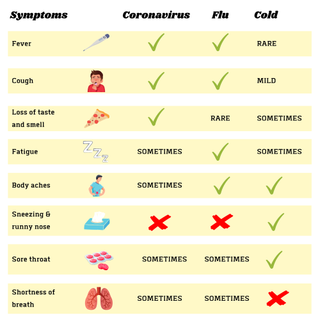Why is Covid-19 worse than the flu and what’s the difference between them?
As flu season approaches, we work out why Covid-19 is worse than flu and what the difference is between Covid, the common flu and a cold.


With the coronavirus pandemic still in full swing and flu season upon us, many are worrying about what will happen if they get one, the other or in the worst case scenario - both at the same time.
When asking 'Why is Covid-19 worse than flu?', it's important to look at the numbers first. Over 51 million people around the world have now tested positive for coronavirus and in the UK alone, there have been over 1.23 million confirmed cases as of November 11. With growing infections around the country unperturbed by the recent restrictions and months of localised lockdowns, it’s likely that along with the common flu, there are many more positive cases of coronavirus to come this winter.
So with a second wave in full swing, worries that we'll be in lockdown until March 2021 and England currently under lockdown restrictions for November, knowing why Covid-19 is worse than flu and the difference between the seasonal flu, the common cold and coronavirus is essential, so you know when you should go and get a coronavirus test.
Why is Covid-19 worse than the flu?
At the beginning of the pandemic, many people thought that coronavirus was equally as bad as the flu and dismissed it. But since then, it's emerged that the immune system's response to coronavirus is different to the basic influenza. Plus, a large number of people who catch coronavirus report much worse short- and long-term symptoms.
"Coronavirus is a new virus so we don’t fully understand how it behaves, why it seems to infect some people worse then others and what the long term effects of it are." Sonal Shah, a London NHS GP tells GoodtoKnow. "It appears as though Covid-19 seems to cause the body to have a much bigger immune response then influenza or other viruses. There is also evidence that it can cause blood clots in the veins and arteries of the lungs, heart, legs or brain."
This is because the coronavirus infects the healthy cells in the body and uses them to replicate and make new viruses, which then infect other cells. Sonal explained to us how it works:
"Your body will try to mount an immune response and fight back, this causes inflammation or swelling of your airways. For most this is usually self-limiting and usually improves within a few days with rest, fluids and managing your temperature. But those whose lungs are impaired or where the immune system is compromised then the infection is harder to fight. For them the air ways fill with mucus and fluid making it harder for the body to breathe as it is unable to get the amount of oxygen it needs. Patients might notice that they are producing a green/brown sputum, or they are wheezing or breathing faster, or they are getting breathless with little effort."
GoodtoKnow Newsletter
Parenting advice, hot topics, best buys and family finance tips delivered straight to your inbox.

If that wasn't bad enough, "In a very small percentage of people they will need extra help with their breathing, which will require hospital admission. Here they may require support from a CPAP machine or a ventilator to help support their breathing."
And that’s not even taking into account the effects of long Covid. Called as such because some coronavirus patients, who might have suffered with just a mild form of the virus, just don’t seem to get better even after months of recovery. Research is ongoing around the condition, but it’s believed that about 12% of UK Covid-19 patients have suffered symptoms for longer than 30 days. In some cases, it’s thought that the effects could last for as long as 90 days.
Those with long condition have taken to sharing their experiences on social media. Freya Sawbridge from Auckland, who is another Twitter user, wrote that after 7 months of long-Covid she is finally feeling better - but still is "not even attempting to exercise".
"My body tells me this is a big no-no, so I still limit myself to gentle walking."
While Hannah Davis, another person with long-Covid, has said that more and more people are coming up against the condition every day.
Meanwhile, those with the flu and no other underlying health conditions often recover within a week or so and rarely, if ever, report intense and lifestyle-changing effects in the months following. So while the short-term effects of Covid-19 might be just as bad as the flu if they are not worse, there’s a troubling rise in the number of people experiencing intense effects long after they’ve tested negative for the virus.
According to Johns Hopkins University Medicine, coronavirus could be as much as 10 times worse than flu (or sadly, even more than that):
"Doctors and scientists are working to estimate the mortality rate of COVID-19, but at present, it is thought to be substantially higher (possibly 10 times or more) than that of most strains of the flu."
What's the difference between Covid-19 and the flu?
The symptoms of influenza - widely called the common flu - and coronavirus are much the same but the prevalence and how they appear can be a key difference between them.
"Covid-19 seems to spread much more easily than influenza and also causes more serious illness." GP Sonal Shah explains, "The other big concern is that it has a much longer incubation period and much longer time where people are contagious. There is also a concern that there are large numbers of people who have the virus but have no symptoms, but are still infectious and therefore may still be spreading infection."

Known as being asymptomatic, it's thought that almost 30% of all those spreading the virus don't have any key symptoms.
"For most people both coronavirus and flu are mild self limiting illness causing a fever and respiratory symptoms such as cough and sore throat, and sometimes headache and sore throat. One of the big differences between flu and Covid is that Covid causes an acute loss of taste and loss of smell." Sonal adds, "Contact with influenza takes between 1-4 days to cause an infection, and usually contagious for up to 7 days. In coronavirus this can be anything from 2 to 14 days after being exposed. Its also possible to spread the infection for 10 days after being infected.
https://www.youtube.com/watch?v=t1bG0_lHdgE
The best way to work out if you've got coronavirus rather than the flu or a cold is to get tested for Covid-19, either by going to a testing site or having one sent to your home if you're unable to safely travel. During that time and when you're waiting for the test, it's important to self-isolate at home as well.
When does flu season start in the UK?
Flu season comes around every year between the months of December and March. However, it’s been widely known to start in October and stick around until May in some cases.
With the combined threat of coronavirus and flu this winter, the government has now offered 30 million people the flu jab. They have also expanded the eligibility of a free flu vaccine on the NHS to include more of the population. Instead of a hospital or GP surgery, there are a number of places where you can get a flu jab, including Boots pharmacies and ASDA.

Grace Walsh is a health and wellbeing writer, working across the subjects of family, relationships, and LGBT topics, as well as sleep and mental health. A digital journalist with over six years experience as a writer and editor for UK publications, Grace is currently Health Editor for womanandhome.com and has also worked with Cosmopolitan, Red, The i Paper, GoodtoKnow, and more. After graduating from the University of Warwick, she started her career writing about the complexities of sex and relationships, before combining personal hobbies with professional and writing about fitness.
-
 Top 20 rare baby names for 2024 revealed, with some celestial and regal entries
Top 20 rare baby names for 2024 revealed, with some celestial and regal entriesParents looking for rare baby names need look no further - these 20 monikers fit the bill for being unique while remaining suitably understated.
By Lucy Wigley Published
-
 Prince George is ‘a chip off the old block’ says body language expert as she highlights the similarities between him and his dad Prince William
Prince George is ‘a chip off the old block’ says body language expert as she highlights the similarities between him and his dad Prince WilliamThe father/son duo share an incredibly close bond
By Charlie Elizabeth Culverhouse Published